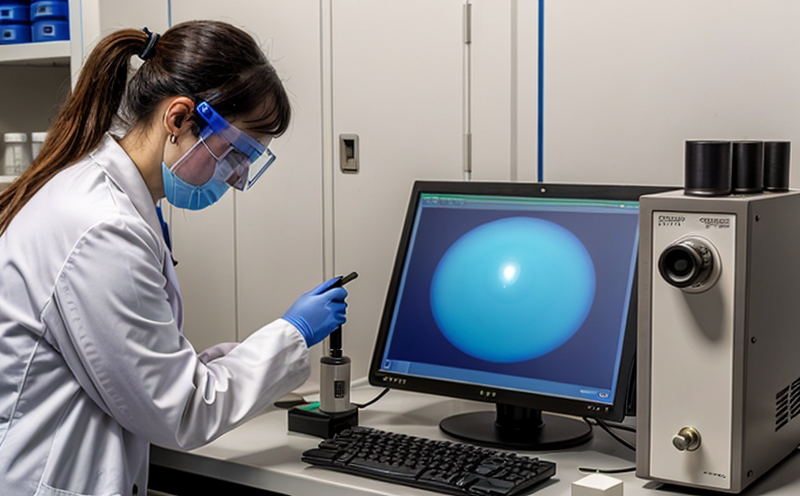ISO 11290 Fluorescence Spectroscopic Testing of Microorganisms
The ISO 11290 standard specifies the procedures for fluorescence spectroscopic analysis to quantify microorganisms in various matrices. This method is particularly useful in industries where microbial contamination can have significant implications, such as pharmaceuticals, food and beverage, environmental monitoring, and water treatment.
The technique relies on the principle that certain microorganisms exhibit specific fluorescent properties when exposed to UV light. By measuring the intensity of fluorescence emitted by these organisms, we can accurately determine their concentration in a sample. This approach is non-destructive and provides precise quantification with high sensitivity.
Before analysis, samples undergo rigorous preparation steps that involve dilution and filtration if necessary to ensure accurate measurement. The fluorescence spectrometer used for this service operates within the 250-400 nm wavelength range, which corresponds to the optimal excitation wavelengths for many microorganisms.
The process begins with thorough sample collection followed by homogenization and dilution according to ISO standards. Afterward, samples are analyzed using a fluorescence spectrophotometer that measures the fluorescence intensity at specific wavelengths. Data is collected and processed to generate a report detailing the concentration of target microorganisms in parts per million (ppm).
The accuracy and precision of this method are enhanced by its ability to differentiate between different types of microorganisms based on their unique spectral signatures. This allows for precise identification as well as quantification, which is crucial for ensuring product quality and compliance with regulatory requirements.
For pharmaceutical applications, this testing helps in verifying the purity of raw materials or final products by detecting any unwanted microbial contaminants. In food safety contexts, it aids in identifying potential sources of spoilage or pathogens early in the supply chain. Environmental monitoring benefits from this service through more accurate assessments of water quality and soil contamination levels.
| Industry Sector | Application Example |
|---|---|
| Pharmaceuticals | Detection and quantification of microbial contamination in drug products. |
| Food & Beverage | Safety checks for potential pathogen presence during processing stages. |
| Environmental Monitoring | Evaluation of microbial load in water sources to ensure safe drinking standards. |
Industry Applications
- In the pharmaceutical sector, ISO 11290 is used to ensure drug product purity by identifying and quantifying microbial contaminants.
- The food industry employs this technique for detecting potential pathogens in production environments or finished goods.
- Environmental agencies utilize it to monitor water quality parameters including biological oxygen demand (BOD), total organic carbon (TOC).
Eurolab Advantages
Our state-of-the-art facility ensures accurate and reliable results every time. We utilize the latest technology from reputable manufacturers such as Thermo Fisher Scientific, which guarantees consistent performance across all our tests.
We employ highly qualified scientists who possess extensive experience in microbiology and spectroscopy. Their expertise allows us to provide comprehensive interpretations of your data, offering valuable insights beyond mere numbers.
Our commitment to quality extends to every aspect of the testing process – from sample preparation to final report generation. We follow strict protocols defined by international standards like ISO 17025 for method validation and calibration.
We also offer fast turnaround times, ensuring that you receive your results promptly so that you can take necessary actions swiftly if issues arise.
Customer Impact and Satisfaction
- Pharmaceutical companies benefit from reduced risk of product recalls due to microbial contamination.
- Food producers experience improved brand reputation through enhanced food safety practices.
Our clients often report increased confidence in their supply chains as they gain detailed information about the microbial content in their products. This leads to better decision-making processes and ultimately contributes positively towards business growth.





